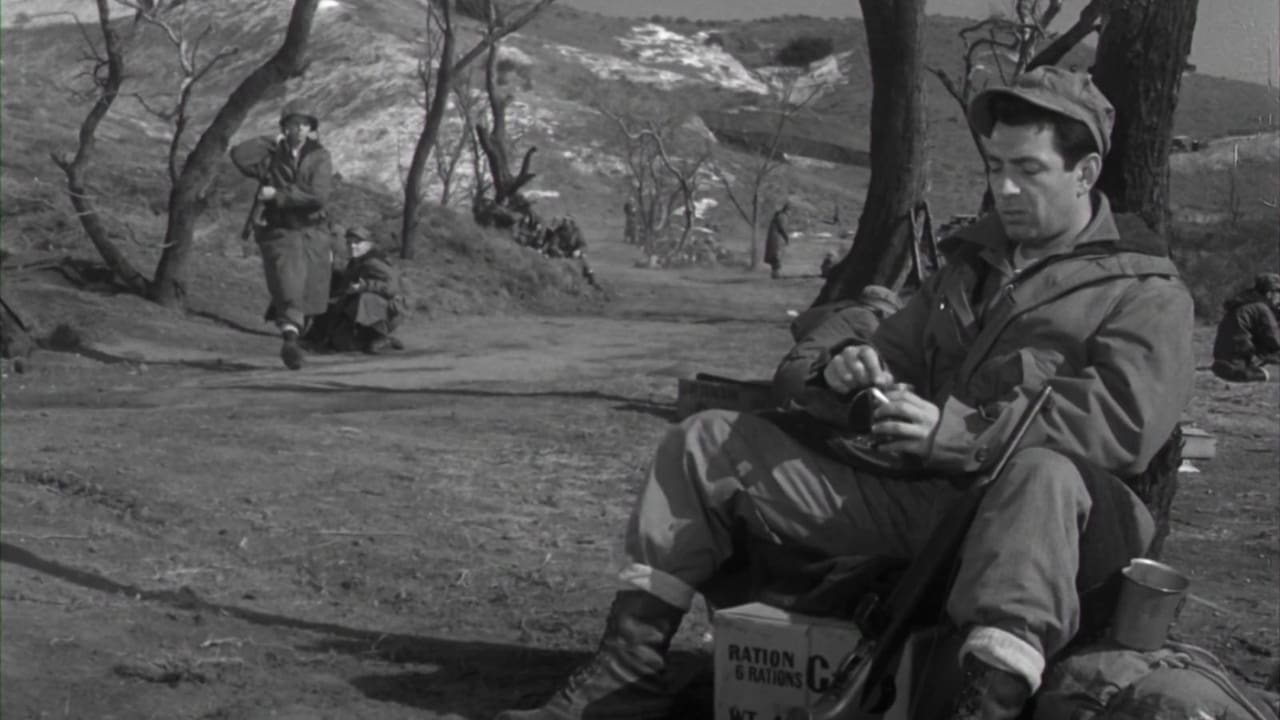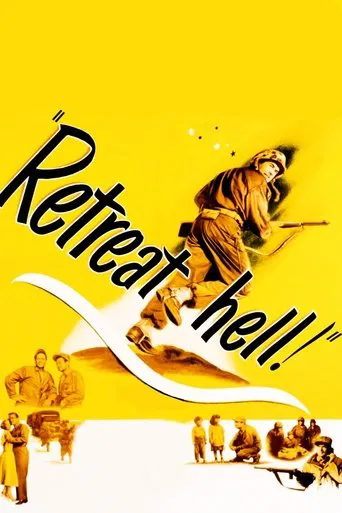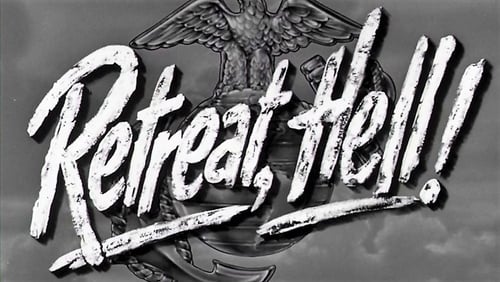


RETREAT, HELL! is a fun and patriotic little Korean War movie with a greater emphasis on characterisation than most B-flicks of the era. Shot in black and white on a low budget with the copious use of (decent) stock footage of the real war, this follows a reluctant captain (played by CREATURE FROM THE BLACK LAGOON's Richard Carlson) as he leads his men against overwhelming numbers of Chinese and North Koreans during that violent escapade. The film's script is snappy and the characters are well drawn, even if only a few of them get our focus: Frank Lovejoy's no-nonsense lieutenant colonel stands out here, as does Russ Tamblyn's ever-so-youthful recruit (and it must have been one of the few times that an actor's age matched that of the character he played). RETREAT, HELL! doesn't have the finest action scenes you'll see, but it doesn't prove to be boring either, and I rather liked it.
... View MoreDirected by Joseph Lewis, 'Retreat ' has action, likable melodrama, well-meant drama (at 1st, I took it for a portrayal, of the captain, but then he morphs into a smiling, paternal officer, almost a priestly one; regardless, there is enjoyable, if conventional, mostly phony portraiture: the sensitive captain, the righteous colonel, the brave kid), a good small cast (playing marines from the 1st battalion of the USMC fighting in Asia, the plot picks up a few people), desolate wintry landscapes, barren frozen hills, 'actual combat film', some _fanfaronade . Its militarism and colonialism are ideological and obtuse. They were so in the British boys' yarns written a century before this movie was made. J. Lewis makes no attempt at explaining this war, of giving its reason. He merely strives to boost the will to fight. The marines are a sheer grace by their mere presence in a foreign country. From this angle, it's sillier than the British colonialism, which hinted to an aim, beyond the hecatomb itself. 'Retreat ' upholds the militarist ideology of the yank foreign policy. Willis and Rourke have the same ideas today.If you wish for a war movie, the director mastered the craft, Lewis meant to teach kids that fight is worth, also the pride of being a marine, and we are taught, with uplifting music, that 17 is a good age to go to war, because the President cares for you and your family, and the army will gulp as many sons as offered, perhaps the kids are at 1st a bit morose, but only until they come to learn; it's a lively, well directed movie (the smoothness of the ancient Hollywood, so misunderstood of its New Wave French fans ), with a mediocre script taken over by silliness and shamelessness. There are several battle scenes, exciting and suspenseful, like the one with the grenade, or the one with the bazooka and the tank; most of the acting, save the action scenes, which are enthralling, was phony and dissonant, perhaps it seemed less so 60 yrs ago, but perhaps to some it seemed offensive even then. The officers are chivalrous, kindhearted, sensitive and wise . The captain himself is taught, and learns, grace to the prudence and insight of the colonel. In the 2nd avatar of the captain, his sunny, trusting smile made me almost suspicious of his sanity, but it became unequivocal that it was only meant to show his newfound optimism. At 1st, he was anxious, but then, with help from his colonel, he fights resolutely for his country.As its main subplot (!), 'Retreat ' is a kids' movie, about a boy in war. The title means that the retreat becomes a victory march ('retreat my ass', the triumph of retreating victoriously). So pushing kids to enlist, why not, maybe Lewis believed in this rubbish. Yet I feel like I am being unfair to this movie, even on my own terms, even being given its phoniness; but the craft becomes a tool for militarism and colonialism, and for the will to fight without ever asking why. The objections aside, 'Retreat ' is likable, suspenseful, occasionally dramatic, at first funny, and nicely crafted by a man, J. Lewis, who knew his job and meant no harm.
... View MoreRETREAT, HELL! - 1952 This film, one of several that more or less, tell the same story about the U.S. Forces retreat from the Chosin Reservoir in North Korea.The film starts in the States with ex-Marine officer, Richard Carlson being called back to active service. Carlson is not all that happy with the recall but reports. His commanding officer is hard as nails, Frank Lovejoy. It is the job of the few World War Two veterans to train the fresh recruits and whip them into combat ready soldiers.Training is somewhat rushed because of the desperate situation going on in South Korea. The Reds have overrun most of the country and pushed the few surviving forces into a pocket on the southern end of the country.U.S. Forces launch a counterattack by landing at Inchon and flanking the North Korean Army. The Reds soon cave and the chase is on all the way up the peninsula. Just as it looks like the war might end, the Chinese Red Army comes boiling over the border from China. This catches the U.N. forces by surprise forcing, shall we say, a rather retrograde manoeuvre.The film follows Lovejoy's Marine battalion from training, through the Inchon landing, up through the North, and as they make their way back south.The Marines are badly outnumbered, low on ammo and poorly supplied with winter equipment. The Chinese Reds throw massive human wave attacks at the unit. This causes a dangerous run on medical supplies, and further depletes the already low ammunition reserves.It is only the odd air supply mission and constant air support that gives the Marines a chance to make their way to safety. Soon their trucks are out of fuel and they are forced to carry their growing collection of wounded. The Marines work their way through several more Red attacks and ambushes. Lovejoy gets wounded and Carlson must take command.They are joined along the way by various other retreating units, including some British Royal Marines. Needless to say they manage to make it safely to the coast and are evacuated by sea.The film, like, Alan Dwan's HOLD BACK THE NIGHT, Sam Fuller's THE STEEL HELMET, FIXED BAYONETS and Anthony Mann's MEN AT WAR all deal with this same retreat. This Joseph H. Lewis directed work is quite watchable, by not quite as good as these others. Alan Dwan directed the superb WW2 Marine film, SANDS OF IWO JIMA.The acting is fine, and the look of the film is quite good with ex special effects man, Warren Lynch at the cinematography controls. The film's director, Joseph Lewis is best known for several cracker-jack film noir such as, SO DARK THE NIGHT, MY NAME IS JULIA ROSS, THE BIG COMBO and of course, GUN CRAZY.
... View MoreIt's surprising that there isn't a decent DVD available for "Retreat, Hell!" It's a good example of the kind of war movie that was produced during World War II and a few of the post-war years, before the war was reexamined and faced more realistically.It has elements of all the generic conventions. Frank Lovejoy is the Marine colonel who has to whip his battalion of raw recruits (is there any other kind?) and retreads into shape. His tactic for achieving this is to morph into Frank Lockjaw. Only towards the end does he begin to show his more sensitive side. Yes, on the surface he may be crusty and hard-hearted. But underneath that, he's a real softy. It's a good thing they didn't dig any deeper into his character or they might have found another layer in which he was a real MEAN SOB.Richard Carlson is the retread from World War II, a reservist pulled back into active duty as a company commander. He's forced to move his wife and two lovely kiddies into a Quonset hut and he's deprived of their company, despite his whining to Lockjaw. He toughens up though and learns to be a Marine first.There is the kid, Russ Tamblyn, who at this stage of his career could not yet act, who must prove himself as much a Marine as the rest of the men in his family. (He looks about fourteen.) One of his brothers is an officer serving near Tamblyn's unit and we know at once, when Tamblyn asks for permission to visit after a battle, that the brother is KIA.Then there is the somewhat slow, drawlin' Southrin boy who provides a bit of comic relief, though not much. And the Gunnery Sergeant who must harden his men for battle.The usual conventions are followed. There is the mail call ritual, the fierce climactic speech about how we'll fight on and reach our goal, outnumbered and surrounded though we may be. The final entrance of the troops and equipment into Allied lines. And when some bystanders ask this ragged group what outfit they belong to, Frank Lovejoy (now thoroughly humanized) straightens up and replies proudly, "First battalion, United States Marines." It really does hark back to World War II movies. The enemy are faceless. The rifle shots don't sound like rifle shots at all. A fired weapon emits a modest ka-Whoosh instead of a loud pop. There is the tension of waiting while the enemy approach like black cockroaches over the snowy hills and our troops are out of ammunition until, at the last moment, the skies clear and cargo planes make the necessary drop, just as in "Battleground", a superior example of the genre.Some of the engagements are shot in the hills around Hollywood, but there is some combat footage from Korea inserted too. The actual events have been cleaned up a bit for public consumption. The reason the Marines and the Army had been caught with their pants down is that they had sailed northward through the British lines as if on a picnic. MacArthur had found little resistance in North Korea and was determined to thrust quickly through to the Manchurian border, while the more prudent British adopted a cautious advance on a broad front. MacArthur had assured President Truman that there was no chance of Chinese intervention, a big misjudgment. MacArthur had also declared the men would be home by Christmas which didn't happen and this is mentioned by one or two characters in the film, but sadly, without bitterness. The retreat from the reservoir was genuine hell. The weather was bitterly cold and frostbite was common. The Chinese troops had more protective clothing than ours. And omitted from this movie are newsreel scenes of frozen bodies being dragged on sleds behind trucks during this slow, sixty-mile retreat.I'd give this movie bonus points for having taken a chance on its being about a retreat instead of a victory. We don't hear much about Korea these days. It ended in a stalemate. Retreats, defeats, and stalemates are the stuff neither of legends or commercially successful movies. They don't follow the accepted scenario in which we either win or put up a gallant fight before being wiped out by a treacherous foe. "A Bridge Too Far" was another risky production. I doubt that this one would have been made in quite the way it was except for a proclamation by one Marine officer who, when asked if they were retreating, said, "Retreat, Hell. We're just advancing in a different direction." A ringing line like that is enough to transform our perception of what we are witnessing on the screen.
... View More